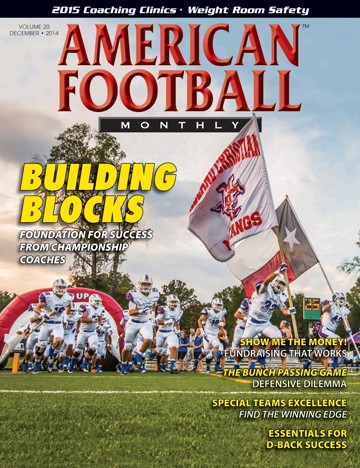Article CategoriesAFM Magazine
|
Coach to Coach: Energy Regulation - The Pressure and the Phenomby: Tim MitchellSports Psychology Consultant © More from this issue The best quarterback on the team is a sophomore. He’s 6’2” and built like a tree. His whole life has been filled with off season camps and QB gurus. He has all the physical attributes a coach could wish for. Everybody on the team has great expectations for this phenom. Anything less than a championship by the time he’s a junior or senior will be a great disappointment. It’s game time, and he knows everyone’s watching. He can feel the pressure. His stomach doesn’t feel so good. He’s getting nervous. He feels like throwing up. His palms are sweaty. It’s Friday night and there is no retreat. What can we do to help our players manage their nerves and prioritize their energy in the proper direction? First, we need to understand the nervous system is something we can regulate with a few different mental tools. We don’t want to be too high or too low so we need to understand how to regulate the nervous system to meet the demands in any situation. In the case of the sophomore QB, we might need to employ some breathing exercises to bring him down or it may be as simple as recognizing how he deals with pressure to help him interpret that pressure properly. Every athlete reacts differently to various situations. Here are some mental fundamental tools that can help your football players control their oil pressure gauge. The mentality is that we will harness everything we think, feel and do. I’ve mentioned before the exercise of drawing a circle on the white board. In that circle, athletes can write down the elements within their control. Outside the circle they write down what they can not control. As athletes get better at using mental skills, they should start to recognize that interpreting their emotions is something they can control. I’m going to identify some mental tools that directly regulate energy level. Our body breathes automatically throughout the day and while we are sleeping. A simple exercise to calm the sympathetic system down can be done though intentional diaphragmatic breathing combined with a directional thought (a thought inspired by gratitude). Remember we can control what we think, feel and do so this exercise is taking control of all those things. Have your players put one hand on their chest and one hand on their belly. As they take deep breaths, ask them if they can feel their chest rise or their belly rise. If they feel their chest rise direct them to concentrate on making their belly rise. Diaphragmatic breathing is achieved when the belly rises. Babies naturally breath this way. As we get older or tense up, we tend to breath with our chest. Breathing from our chest can often be connected to muscle tension and stress. Changing the way we breath in hectic times can bring our nervous system back inline. When you connect deliberate breathing with proper thoughts you can control your heart rate. The combination of this deliberate breathing and thinking gives athletes the ability to regulate themselves for whatever the task may require. Do I need to calm down or do I need to amp up? Those symptoms are the body’s way of telling the athlete “we are ready to perform”. The body is amping up for high performance, not cracking under the pressure. The first step to helping your football players with crazy pre-performance symptoms is to identify the symptoms and then redefine why they happen. I always tell them, “It’s because you care. This performance is very important to you and that’s why you’re nervous. You want to do well and your body is reacting to that desire.” Take three deep diaphragmatic breaths. Upon exhale, focus on your center and feel gratitude for this moment. Repeat as needed. This one may sound too simple. When it comes to regulating energy, studies show that sleep deficits have a brutal effect on the body’s ability to perform. The main take away here is to consider sleep just as important as diet and hydration. Your players need to sleep 7-8 hours minimum. There is no substitute. We don’t claim to have a magic wand in sport psychology. Some tools I mentioned seem like common since because they are. It’s up to you to make them important. How important is the mental game? How much of the game is mental? How do you coach that part of the game? It’s subtle but crucial. Good luck. s |
|
| HOME |
MAGAZINE |
SUBSCRIBE | ONLINE COLUMNISTS | COACHING VIDEOS |
Copyright 2025, AmericanFootballMonthly.com
All Rights Reserved




